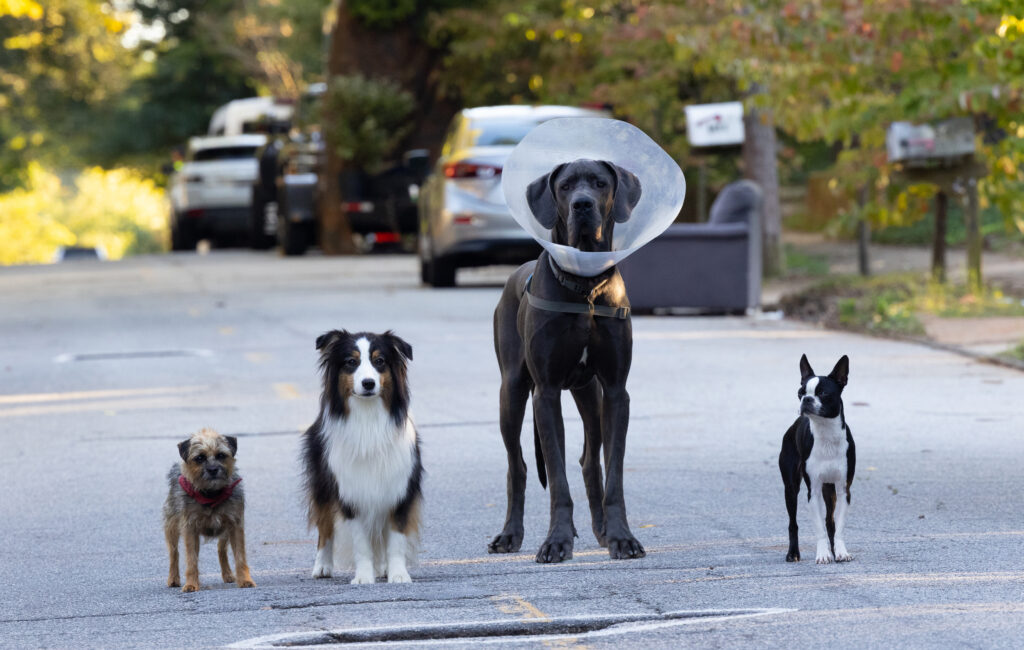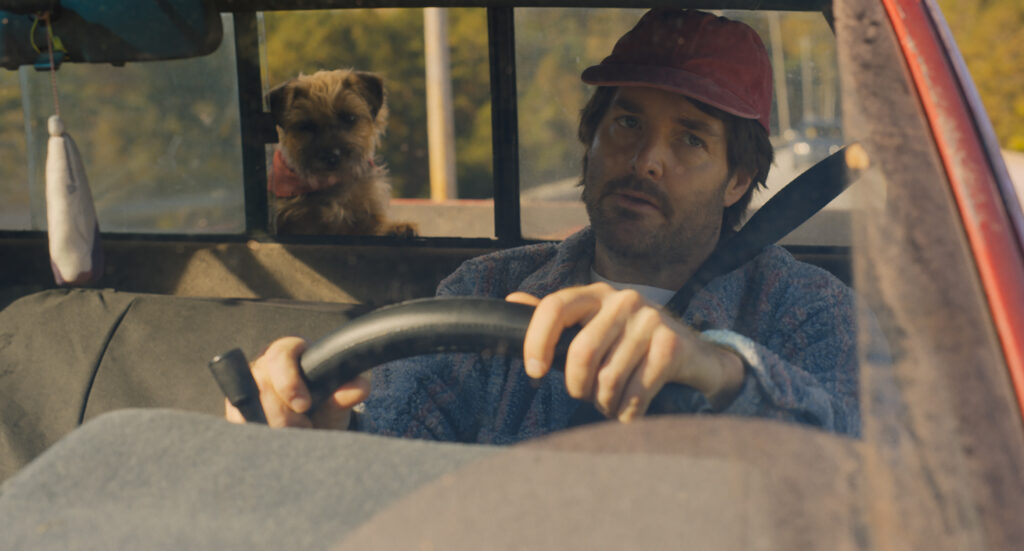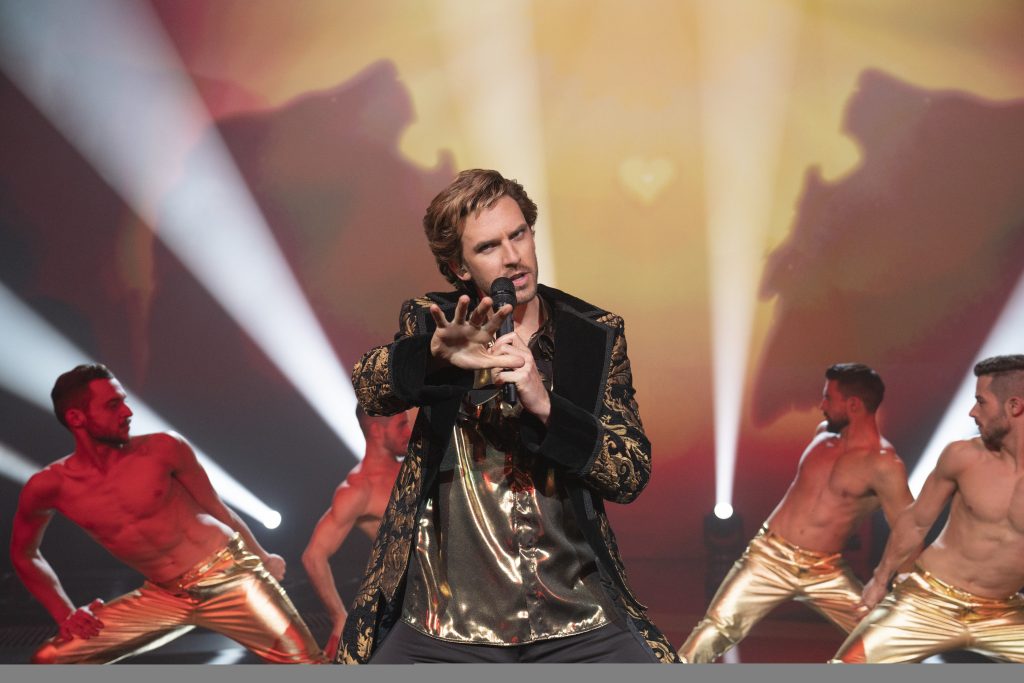August 17, 2023
by Carla Hay

Directed by Josh Greenbaum
Culture Representation: Taking place in an unnamed U.S. city, the comedy film “Strays” features a cast of dogs and a predominantly white group of people (with some African Americans and Latinos) representing the working-class and middle-class.
Culture Clash: Four stray dogs band together to get revenge on the sleazy and abusive man who abandoned one of the stray dogs.
Culture Audience: “Strays” will appeal mainly to people who are fans of the movie’s headliners and anyone who doesn’t mind watching intentionally vulgar comedies about adorable animals that have some sweetness with the raunchiness.

The purpose of “Strays” is to disrupt the image that people have of movies where cute animals talk. It’s the “Jackass” of talking animal movies: crude, comedic camaraderie. If you can’t tolerate a lot of jokes about bodily functions, then avoid this film.
Directed by Josh Greenbaum and written by Dan Perrault, “Strays” has been very clear in its marketing that this movie is not a “family-friendly film” that’s appropriate for people of all ages. This is most definitely a very adult-oriented film for adults who aren’t easily offended when watching movies filled with cursing, gross-out scenes involving body waste, and explicit talk about sex. The fact that domesticated dogs who talk like humans are supposed to be the source of all this raunch is the whole point of the movie.
In “Strays” (which takes place in an unnamed U.S. city but was filmed in and around Stone Mountain, Georgia), viewers are first introduced to the movie’s narrator. He’s an optimistic and eager-to-please Border Terrier (voiced by Will Ferrell), who has lived his entire life with a loser named Doug (played by Will Forte), who never gave this dog an official name. Instead, Doug calls the dog horrible names that usually have the word “shit” in the name. (In real life, this Border Terrier is a female named Sophie.)
In the beginning of the movie, bachelor Doug is unemployed and living in a messy house. Doug spends his days and nights getting stoned and masturbating. A phone conversation between Doug and his mother reveals that Doug can’t live near a school that has children, which is the movie’s way of saying that Doug is a registered sex offender. Because the Border Terrier doesn’t know any better, he thinks Doug is a great person.
Doug likes to do something that the Border Terrier thinks is a game called “Fetch and Fuck.” Doug throws a tennis ball far away, so the Border Terrier can run off and fetch the ball. Doug only does this because he hopes the dog will get lost and never find his way back home. When the dog inevitably does find his way back home, Doug says out loud in anger: “Fuck!”
One day, Doug drives the Border Terrier several miles away, into the inner part of a big city where the dog has never been to before. Doug throws the tennis ball, knowing that this dog will be too far away to walk back to the house. Doug then drives away. Doug’s heinous plan works, and the Border Terrier gets lost.
While out on the street at night, the Border Terrier meets a rebellious and tough-talking Boston Terrier named Bug (voiced by Jamie Foxx), who sees how naïve this Border Terrier is and offers to teach him how to survive on the streets as a stray dog. (This Boston Terrier’s name is real life is Benny.) Bug calls this Border Terrier the name Reggie, since that’s the name that one of Doug’s girlfriends used to call this Border Terrier.
Bug tells Reggie that humans can’t be trusted and a dog’s life is better without having an owner because the dog has the freedom to do whatever the dog wants. Bug believes that humans “brainwash” dogs into thinking that dogs need humans. Bug also tells Reggie that stray dogs shouldn’t get too close to other dogs either, because all stray dogs should eventually learn to fend for themselves. Bug’s past is eventually revealed to explain why he detests humans. One of Bug’s quirks is that he is fixated on humping inanimate objects, including furniture (Sofia Vergara voices a character called Dolores the Coach) and lawn decorations.
Soon, Reggie is introduced to two of Bug’s closest dog acquaintances: Maggie (voiced by Isla Fisher) is an Australian Shepherd who is intelligent and has a super-keen sense of smell. She is a stray because her previous owners preferred to have a puppy. (In real life, this Australian Shepherd’s name is Elsa.) Hunter (voiced by Randall Park) is a Great Dane who is insecure and often fearful. Hunter trained to be a police dog, but instead he was placed in a retirement home to be a therapy dog for the elderly residents, and he ran away. (In real life, this Great Dane’s name is Dalin.)
This motley canine quartet then goes on a series of misadventures. All other animals in the movie do not talk. The only living beings that talk in the movie are dogs and humans. An English bulldog named Chester (voiced by Jamie Demetriou) makes a brief but memorable appearance as a neurotic dog who imagines that there is an invisible, electrical fence surrounding his front yard. The four strays also encounter a German Shepherd named Rolf (voiced by Rob Riggle), a K-9 police dog who trained with Hunter at the same K-9 academy.
Two other noteworthy dog characters in the movie are a philosophical Labrador Retriever named Gus (voiced by Josh Gad) and a feisty Chihuahua named Shitstain (voiced by Harvey Guillén), who is almost as combative as Bug. And when there’s a movie about stray dogs roaming around a city, there are inevitable scenes of the dogs trying to evade capture from the animal control officers. “Strays” also has some scenes that take place in an animal shelter, where an animal control officer named Willy (played by Brett Gelman) has a job that’s similar to a jail guard/janitor.
Dennis Quaid makes a cameo portraying himself as a bird watcher. Why is Quaid in this movie? Quaid is the star of 2017’s “A Dog’s Purpose” and 2019’s “A Dog’s Journey,” two sentimental dramas about a “talking” dog (voiced by Gad) who gets reincarnated and whose thoughts are heard in voiceover narration. Quaid and Gad being cast in “Strays” is obviously the “Strays” filmmakers’ way of poking fun at family-oriented talking dog movies.
For a great deal of the story, Reggie is denial that Doug abandoned him and that Doug is not a good person. When the truth finally sinks in with Reggie, he decides that he’s going to get revenge on Doug, with the help of his new stray dog friends. If anyone watching “Strays” complains about how unrealistic this movie is, the question must be asked: “What part of ‘talking dog movie’ do you not understand?”
The comedy in “Strays” is far from award-worthy, but it does bring some laughs, and it doesn’t try to pretend to be lofty art. The biggest flaw in “Strays” is an over-reliance on jokes and gags about defecation. However, the best parts of the movie have to do with the friendship that develops between these four dogs. Hunter has a crush on Maggie, so there’s potential for more than a friendship between them.
The expressions on these dogs’ faces are enough to charm viewers who like dogs, although obviously much of what is in the movie involves visual effects using computer-generated imagery. The voice actors also play their roles capably, with Foxx and Ferrell being the obvious standouts. As long as viewers don’t have skewed or misunderstood expectations for “Strays,” it can be amusing entertainment with some genuine, laugh-out-loud moments. It’s not the type of comedy for everyone, but neither is “Jackass.”
Universal Pictures will release “Strays” in U.S. cinemas on August 18, 2023.




